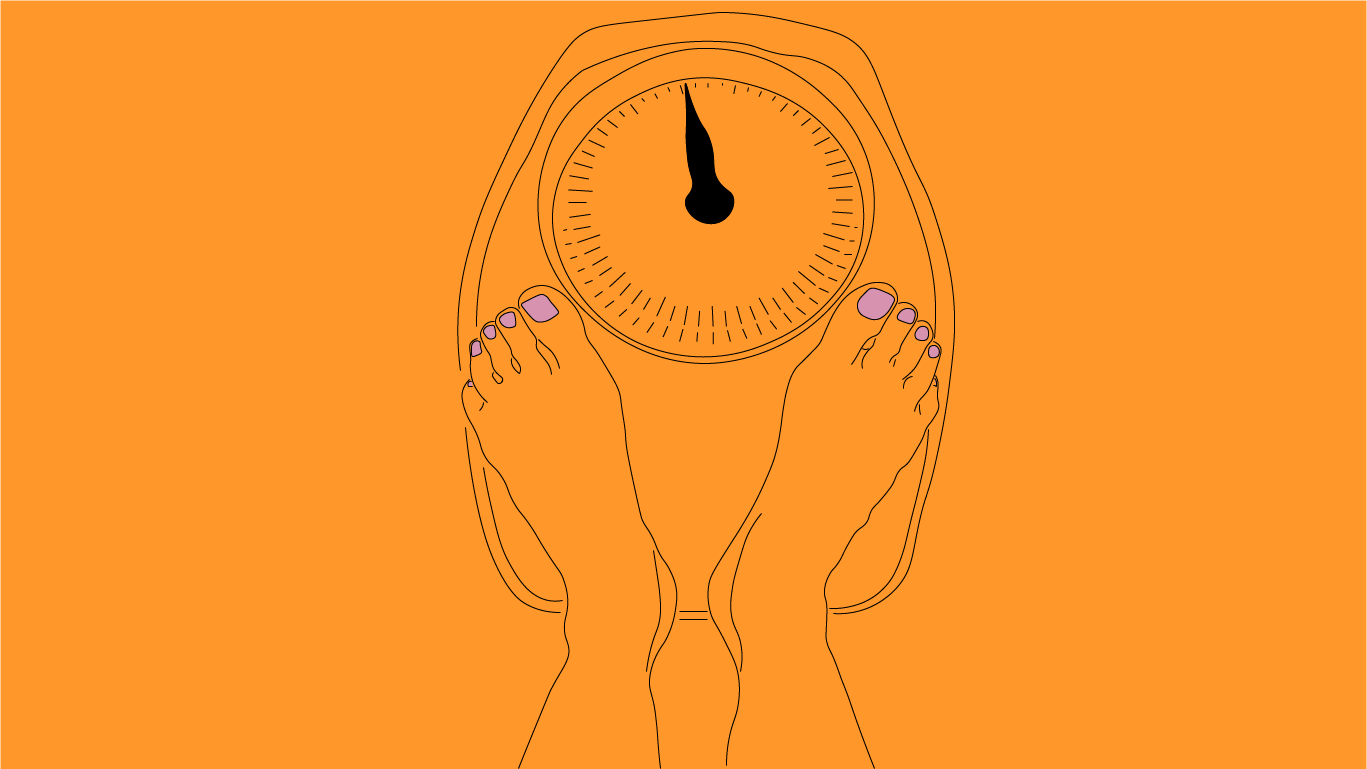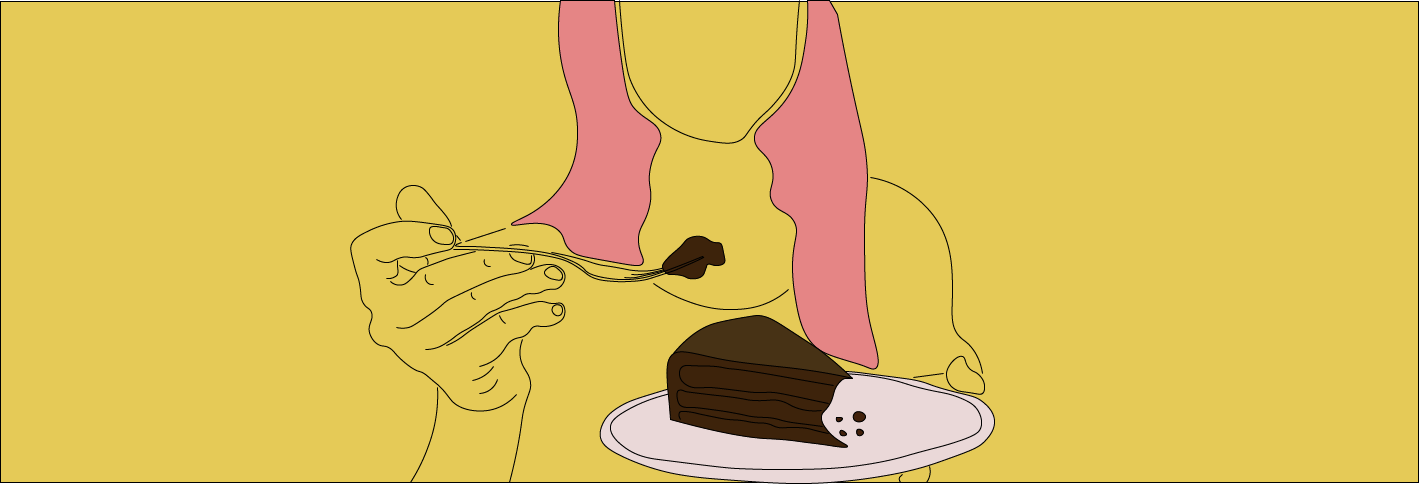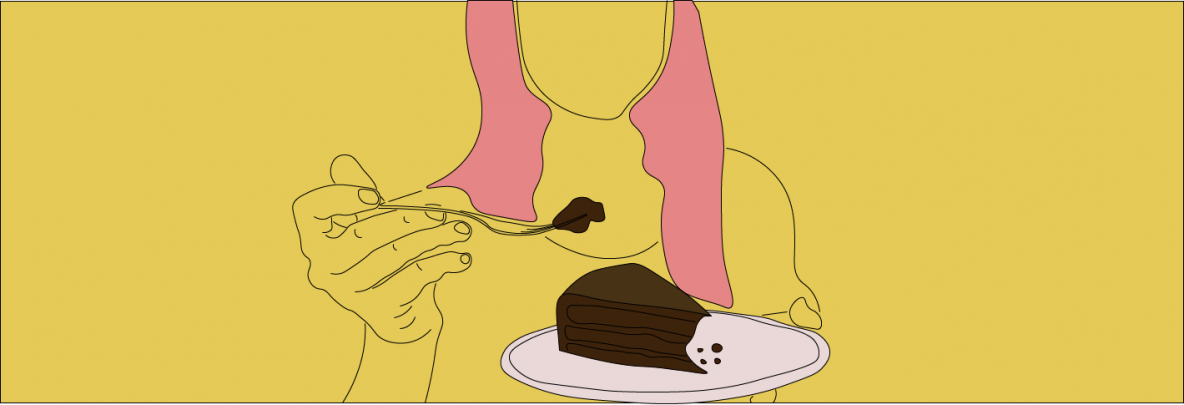My cries for help were finally heard in the silence of lockdown
How lockdown helped me seek the help I needed for my eating disorder
By Paulina U. / 16 December 2020

Illustration by Lena Blacker
*Trigger Warning: mention of eating disorders*
Lockdown this and lockdown that; for months we heard about how destructive and devastating it was. It left many traumatised, the reality of our stability being as fickle as dandelions in the wind. For a while everything was still and, in that silence, I finally heard my body’s cries for help.
A student living and working in London, I exhaled the words “I’m busy” and “I don’t have time for that” nearly as often as I took in air. Out of the house by 9 am and usually not back till 10 pm, the only action my bed saw was my insomniac twisting during the night. I had no time to socialise. I had no time for ‘self-care’. Above all, I had no time to have fun. I was spiralling out of control and the only thing I could control was what entered my mouth. Then the guilt and restriction began. A week of limiting my calories turned to months of restrictions. Then it became a daily habit and then a year passed and I kept pushing my limits. I couldn’t stand up without fainting or eat without my head telling me I was weak and ugly and useless. I couldn’t fulfil any task as my body was lacking the nutrients needed to function, then I restricted even more as punishment. It was a spiral of self-destruction.
I was suffering both physically and mentally. Before long, I had dug a hole so deep I could no longer find my way out. Even when I ended up in hospital after drinking myself into oblivion, I ignored it, feeling like a failure and punishing myself even further. I am fine, it is not an eating disorder, it is not anxiety and it is definitely not depression, I kept telling myself, it’s just stress. The stigma haunted me and I was not going to admit that I was not in control; just another privileged girl with body issues and attention-seeking tendencies. Then lockdown hit and I lost my autonomy; I moved back in with my parents, lost my job and finished my university assignments. The noise of life was gone and so were the distractions which fuelled my days and made me too exhausted to think at night. It was finally silent and I was able to look in the mirror and see how exhausted I was. I was playing a dangerous game and I was losing.

I needed help and that was harder to ask for than I ever could have fathomed.
I was so out of my league. I felt empty, I couldn’t remember the last time I had laughed or cried. Interactions with other people exhausted me and I no longer had hobbies or ambition. The physical temptation of food was fighting my mental aversions to it. My parents were concerned with my physical body as even the smallest size in the petite range swallowed me whole. I was shivering during the summer heatwaves. My friends kept commenting on how thin I looked and I thought they were lying. I spent days staring at the screen, directionless and only ever thinking about food which made me feel revolting. I believed that I was repulsive.
My parents saw me wasting away but I was good at hiding it all, good at pretending it was all okay. Still, nobody can plead health when their body and mind are failing. I was so weak I wasn't even able to hold onto a mug of tea. As summer started and clothes became lighter, my mother confronted me over the way my body looked, the thinly stretched blue skin over weak bones. I ignored her requests to call the doctor, still deluded enough to believe I was fine. It was a safety mechanism and pride, but also the lack of nutrition which made me believe that was true.
She called the doctor behind my back when I refused to. I was in the car with my mother when I took the phone call from an unknown number. I was caught off guard when I found myself speaking to a GP, stumbling out of the car and finding some privacy in the corner of a public car park. She wanted me to come in for a blood test and a general catch-up to identify what was wrong because my mum told her I was sick. When she asked me my opinion I wanted to scream “I know what’s wrong with me” but the words didn’t come out. Instead, I managed to say “I think I have a problem.” At that moment the line was crossed and I finally verbalised that something was wrong. I didn’t have any energy to hide anymore. I cried on the phone as my mum sat in the car, waiting.

The months that followed were filled with calls from strangers, psychologists analysing my life, nutritionists analysing my diet and doctors analysing my heath.
The consensus was clear: Anorexia Nervosa. The diagnosis I knew was true but I still struggle to admit to.
Looking back at myself this time last year I was scared, angry and terrified of life, protecting a fickle image of health. Now I’m still terrified and angry but it’s no longer targeted at myself but rather at my eating disorder. I’m angry that it stole so much of my life away. I’m also determined, working with the NHS eating disorder team to get better, get healthier and enjoy myself again. I have bad days, many of them.
I am not recovered and I don’t know if I’ll ever reach a point of completely ridding myself of impulsive, destructive thoughts. But I have hope and support and for the first time in years, I am excited about the future. The question ‘how are you really doing?’ from a stranger was all it took for me to finally admit that I was struggling. I was subconsciously crying out for help and in the silence of lockdown, I was finally able to admit it. I felt my weakest when I accepted help, and ultimately it was my strongest moment.
If you think you or someone you love is suffering with an eating disorder, you can find help here.
Art by
Words by
Share this article

